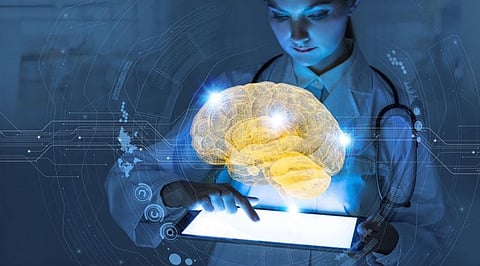

Deep learning is the functional side of artificial intelligence (AI) that enables computers to learn, like how humans learn. Deep learning tools will be imitating the functioning of the human brain for processing data and recognizing patterns for decision-making.
Deep learning, a subfield of machine learning (ML) is built with algorithms inspired by neural networks of the human brain. Deep learning algorithms not only help businesses to develop models that can predict more accurate outcomes to make better decisions but also capable of unfolding proteins to find cures for incurable illnesses.
The molecular chains, each assembled from a menu of 20 types of amino acids, do biology's heavy lifting. In the guise of enzymes, they catalyse the chemistry which keeps bodies running. The proteins of muscles, Actin and Myosin, allow those bodies to move around. Keratin provides their skin and hair, and Haemoglobin carries its oxygen. On the other hand, Insulin regulates metabolism, and a protein called spike permits coronaviruses to invade human cells. Proteins are the origin of existence; the tail of human sperm is composed of several proteins that work together to form a complex rotary engine that propels it forth to fertilize an egg and create life.
Proteins also fold. The final intricate shape they take after folding determines its function. For example, one of them can fold like 'snakes in a can' which when embedded in a cell membrane, creates a tunnel that allows traffic in and out of cells. Other proteins form pockets called 'active sites' that are shaped to bind like a lock and key. By folding into myriad shapes, proteins that are made of the same thing perform different roles. If the proteins are folded incorrectly as they do often, they can cause horrific harm; the accumulation of misshapen proteins. Wrong folds can cause cystic fibrosis and sickle cell anaemia, and other diseases that yet remain unknown.
Henceforth, predicting how a protein will fold has been the biggest constraint. Researchers have used techniques such as X-ray crystallography, but these are too slow. DeepMind's learning from a deep learning program, AlphaFold 2, predicts how a protein will fold. Proteins are even more complicated than Go, a protein that could take any of as many as ten raised to the power of 300 different shapes. DeepMind used a simulation of protein folding analogy to create AlphaFold. Developers taught how to apply intuitive short cuts and rules-of-thumb by feeding powerful computers. Much like Move 37, five lines from the edge of the board, a computer can come up with solutions that stun human experts. In the latest test by AlphaFld 2, it got a score of 92.4, placing a powerful tool relying on medical scientists. Knowing how proteins fold can help to address incurable diseases in an entirely new way. It could also prevent many illnesses.
Join our WhatsApp Channel to get the latest news, exclusives and videos on WhatsApp
_____________
Disclaimer: Analytics Insight does not provide financial advice or guidance. Also note that the cryptocurrencies mentioned/listed on the website could potentially be scams, i.e. designed to induce you to invest financial resources that may be lost forever and not be recoverable once investments are made. You are responsible for conducting your own research (DYOR) before making any investments. Read more here.
